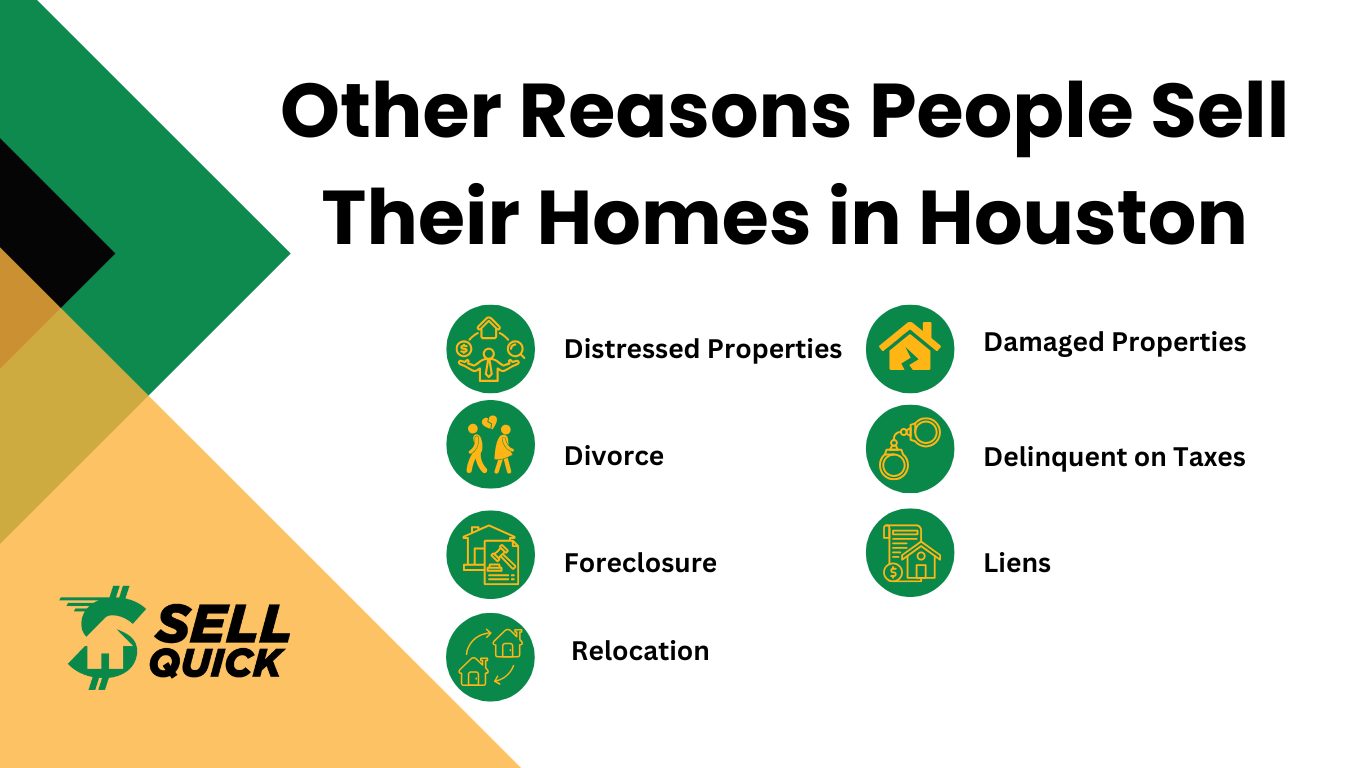Selling your home is never simple, and 2024 brings its own opportunities and challenges for homeowners. In 2024, several reasons might prompt homeowners to put their properties on the market. Whether it’s due to family dynamics, location concerns, job relocation, or changes in life stages, each situation brings its motivations for selling. Below are the top reasons you might consider selling your house in 2024.
1. Family Dynamics
Family situations often play a crucial role in deciding whether or not to sell a house. Life changes like a new baby, kids moving out, or multi-generational living may lead you to reconsider your home’s fit. For example, a growing family may require more space, while empty nesters may find themselves with more houses than they need. In either case, selling and moving to a more appropriate-sized home can provide better comfort and functionality.
2. Location Concerns
Location is everything in real estate, and changing location needs can be a significant reason to sell your house. Sometimes, a once-perfect location no longer serves the homeowner’s needs. The neighborhood has become too crowded, and the commute to work has grown unbearable. You might desire better access to healthcare, schools, or public transportation.
If the area has seen significant changes, like the development of commercial buildings, increased traffic, or a shift in the community’s vibe, it could be a strong reason to consider selling. A house is more than just its four walls; its surroundings also play a crucial role in its value and the homeowner’s quality of life.
3. Job Relocation
Career changes are among the most common reasons people sell their homes. A job promotion, new job opportunity, or a mandatory company relocation may require you to move to a different city or even a different state. In these situations, selling your home can provide the financial flexibility to buy or rent a new place closer to your new job. Sometimes, the urgency of a job relocation can also impact how quickly you need to sell the house, leading you to seek ways to expedite the process.
4. Life Stages
Each stage of life brings different housing needs. Whether a first-time homebuyer is moving to a larger house or a retiree downsizes for convenience, life stages directly influence the decision to sell. Young professionals might start in small apartments or condos but often move to larger homes as their families grow. Retirees or empty nesters may downsize to a smaller, easier-to-manage home after their children move out. Life events such as marriage, divorce, or retirement can also influence the decision to sell. It’s essential to assess whether your current home still fits your needs.
5. Property Conditions
The condition of your home is a key factor when deciding whether to sell. Properties that require extensive repairs or upgrades may cause homeowners to sell rather than invest the time and money to renovate. Some homeowners prefer to sell as-is and leave the update to the next buyer. On the other hand, a well-maintained or recently renovated home can fetch a higher price, making selling an attractive option for homeowners looking to maximize their returns.
6. Market Factors
The current real estate market plays a significant role in deciding whether to sell your home. In 2024, housing market trends are expected to evolve, with interest rates, home demand, and economic conditions influencing prices. If the market favors sellers with high demand and low supply, homeowners may be able to sell their homes quickly and at a premium. Conversely, some homeowners might wait for a better time to sell if the market is slow or if mortgage rates are high.
7. Personal Circumstances
Every homeowner has unique personal circumstances that may affect their decision to sell. Changes in lifestyle, health issues, or a growing desire for a simpler life make selling a home a logical next step. For instance, someone recovering from illness might prefer to live in a home with fewer stairs, or someone dealing with financial struggles may need to sell quickly to ease the burden of a large mortgage.
8. Financial Considerations
Financial circumstances often make selling a house a necessity rather than a choice. Whether you’re facing an unexpected expense, managing debt, or looking for ways to downsize and cut costs, selling your home could provide much-needed financial relief. Alternatively, if your property has appreciated significantly, you might choose to sell to cash in on your investment. Whether you need to free up funds or maximize profits, your financial picture will guide your decision.
9. Investment Opportunities
Real estate can be a powerful investment tool. Homeowners may sell to capitalize on their property’s appreciation and invest the proceeds elsewhere, such as in another home, stocks, or a new business venture. If you want to diversify your financial portfolio, selling your home and reinvesting the equity could be wise.
Additionally, if you own multiple properties, selling one might allow you to free up funds for other projects or take advantage of the current market conditions.
10. Emotional Factors
Selling a home is often an emotional decision. Homes hold memories, and moving on from where you’ve created family traditions and experiences can be challenging. Emotional factors can also drive selling. Maybe the house has too many painful memories attached to it, or perhaps you’re ready for a fresh start in a new location.
Selling a home often provides the closure needed to move on from a particular chapter in life, giving homeowners the chance to start anew.

What are the Other Reasons People Sell Their Homes in Houston?
Common reasons people sell their homes in Houston are damaged properties, divorce liens, and many more. Below are the common reasons people sell their homes.
- Distressed
Homeowners facing financial hardship may need to sell quickly to avoid further losses. Selling can help reduce piling bills or debt. - Divorce
A divorce often requires selling shared property to divide assets. Many couples prefer a fresh start in new homes. - Damaged Properties
Extensive repair is costly, and owners may opt to sell rather than spend on a costly renovation. Many buyers are interested in fixer-upper properties at the right price. - Delinquent on Tax
Falling behind on property taxes can result in pressure to sell before facing penalties or legal actions. Selling helps prevent further financial consequences. - Foreclosure
If one fails to repay a mortgage, foreclosure might be severe. Selling the home quickly can help avoid the credit damage that comes with foreclosure. - Liens
Liens on a property can complicate ownership and lead to the decision to sell. Selling clears outstanding debts tied to the home. - Relocating
Job changes or personal reasons often cause people to move. Selling the home ensures a smooth transition to a new location.
How Does a Property’s Condition Influence Selling Decisions?
A property’s condition is vital in selling decisions, especially if repairs are required. Extensive renovations can be costly, making selling a better option for homeowners who don’t want to invest time and money. A house in a worse condition is more challenging to sell, and Buyers often prefer move-in-ready homes, so selling property in poor condition may lead to a lower price. In contrast, a house well-maintained with modern features and friendly design would appear attractive to buyers.
How Does Upgrading Conditions Impact Selling Reasons?
Upgrading your home’s condition before selling can significantly increase its value and appeal to potential buyers. Simple fixes such as repainting walls, updated lighting fixtures, or modern kitchen upgrades can increase your home’s value and make it more attractive to buyers. Homeowners often sell after upgrades to market the house at a higher price. Well-maintained homes typically sell faster and for more money.
How Do Current Market Trends Influence the Decision to Sell a House?
Current market trends can influence homeowners’ decisions to sell. In a seller’s market, where demand exceeds supply, you may get a higher price for your home. However, in a buyer’s market, you may have to wait for a better market and sell quickly if you don’t have much time. Factors like mortgage interest rates, local inventory levels, and economic conditions play a role. Staying informed about these trends helps you determine the right time to sell.
How Can I Sell My Home Quickly?
If you’re in a situation where you need to sell your home quickly, there are several strategies you can implement to speed up the process. First, ensure that your home is priced competitively. Overpricing can cause your home to sit on the market for too long. You should also focus on curb appeal and consider making necessary repairs to attract buyers. Another option is to offer incentives like covering closing costs to make your home more appealing.
or
If you want to sell your home fast, consider cash home buyers a great option. They can provide a quick, hassle-free sale without costly repairs or extensive marketing. While competitive pricing and curb appeal are essential, cash buyers often purchase homes as-is, allowing you to skip the lengthy preparation process. You can work directly with a cash home buyer, eliminating the need for a real estate agent and speeding up the transaction.
Can I Sell My House Without a Real Estate Agent?
Yes, you can sell your house without a real estate agent, a process commonly called “For Sale by Owner” (FSBO). However, selling without an agent comes with both pros and cons. The main benefit is saving on agent commissions, typically 5-6% of the sale price. However, it requires more effort, as you’ll handle marketing, showings, negotiations, and paperwork yourself. Proper preparation and research are essential for a successful sale.
Selling a house in 2024 can be influenced by a wide range of personal, financial, and market-driven factors. Changes in family structure, jobs, or investments may drive your decision. Considering your property’s condition, market trends, and finances will help you plan for the best outcome.





